Unified Sports Classification System of the USSR and Russia
Unified Sports Classification System of the USSR (Russian: Единая Всесоюзная спортивная классификация) is a document which provided general Soviet physical education system requirements for both athletes and coaches. Similar systems still exist today in several former Soviet republics.
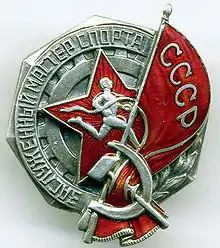

Athletes
The classification was established in 1935 and was based on separate classifications, which existed for several sports disciplines before. Starting in 1949, it was revised every four years, the period, which corresponded to the Olympic cycle, to reflect new standards for the physical training. The document contained test standards, principles and conditions, necessary for the conferment of sports ranks and titles, for all sports, cultivated in the USSR. As of the 1970s, there were following ranks for athletes of the USSR (listed in descending order of value):
- Merited Master of Sport of the USSR, (Russian: заслуженный мастер спорта СССР, abbreviated as "змс", sometimes translated as Honoured Master of Sport of the USSR), equates to international champion who has made valuable contributions to the sport
- Master of Sport of the USSR, International Class (Russian: мастер спорта СССР международного класса; abbreviated as "мсмк"), equates to international champion
- Master of Sport of the USSR (Russian: мастер спорта СССР; abbreviated as "мс"), equates to national champion
- Candidate for Master of Sport of the USSR (Russian: кандидат в мастера спорта СССР; abbreviated as "кмс"), equates to nationally ranked player
- First-Class Sportsman (Russian: спортсмен 1-го разряда), equates to regional champion
- Second-Class Sportsman (Russian: спортсмен 2-го разряда), equates to state champion
- Third-Class Sportsman (Russian: спортсмен 3-го разряда), equates to city champion
- First-Class Junior Sportsman (Russian: спортсмен 1-го юношеского разряда)
- Second-Class Junior Sportsman (Russian: спортсмен 2-го юношеского разряда)
- Third-Class Junior Sportsman (Russian: спортсмен 3-го юношеского разряда)
Each of these titles was awarded only for results on the official competitions. Athletes who qualified for the rank were awarded a badge with serial number.

This system was popular among Soviet satellite states and was used in Bulgaria, Czechoslovakia, East Germany, Poland, and Romania until the breakup of the USSR in 1991.[1] Russia continued the system, and former Soviet republics Belarus, Moldova, Kazakhstan, Kyrgyzstan, Tajikistan, Ukraine and Uzbekistan also maintain a similar or identical ranking system. In Albania, a similar system, the Sports titles one, was started in 1967.[2]
A new sports title called Merited Master of Sport of Russia was created by the Russian government in 2007 to replace the previous one.[3]
Non-Soviet Masters of Sport
The title of Merited Master of Sport of the USSR was awarded to a handful of foreigners.
On 30 January 1952, the title Merited Master of Sport of the USSR was awarded to Agustín Gómez Pagóla,[4] who was born in Spain and started to play football there, but moved to the USSR during the Spanish Civil War in 1937, and played for Torpedo Moscow in 1947–1954,[5] being the team captain in 1951–1953.[6]
In 1972, to mark the 50th anniversary of the establishment of the Soviet Union, this title was awarded to the following prominent athletes from socialist nations:[7]
.svg.png.webp) Maria Gigova (world champion in rhythmic gymnastics)
Maria Gigova (world champion in rhythmic gymnastics) András Balczó (modern pentathlon, Hungarian Sportsman of the Year in 1966, 1968, 1969)
András Balczó (modern pentathlon, Hungarian Sportsman of the Year in 1966, 1968, 1969)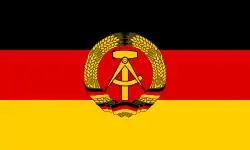 Karin Janz (1972 Olympic champion in artistic gymnastics)
Karin Janz (1972 Olympic champion in artistic gymnastics)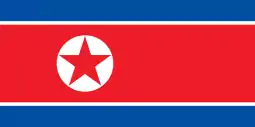 Li Ho-Jun (1972 Olympic champion in shooting)
Li Ho-Jun (1972 Olympic champion in shooting)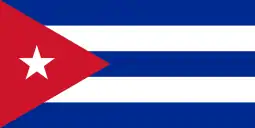 Teófilo Stevenson (1972 Olympic champion in boxing) (he later won in 1976 and 1980 also)
Teófilo Stevenson (1972 Olympic champion in boxing) (he later won in 1976 and 1980 also).svg.png.webp) Khorloogiin Bayanmönkh (1972 world champion in freestyle wrestling)
Khorloogiin Bayanmönkh (1972 world champion in freestyle wrestling).svg.png.webp) Włodzimierz Lubański (1972 Olympic champion in football)
Włodzimierz Lubański (1972 Olympic champion in football).svg.png.webp) Nicolae Martinescu (1972 Olympic champion in wrestling)
Nicolae Martinescu (1972 Olympic champion in wrestling) Ondrej Nepela (1972 Olympic champion in figure skating)
Ondrej Nepela (1972 Olympic champion in figure skating)
Coaches
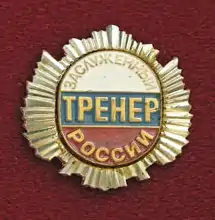
Under the Soviet system, titles were awarded to coaches based on national and international success. Significant International success brought Merited Coach of the USSR while national success was rewarded with Merited Coach of one of the Soviet republics.
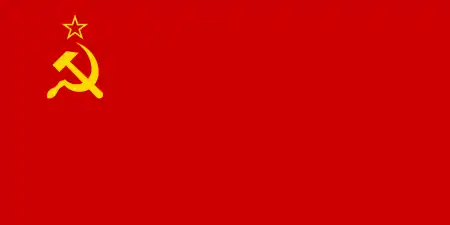 Merited Coach of the USSR (Russian: Заслуженный тренер СССР)
Merited Coach of the USSR (Russian: Заслуженный тренер СССР).svg.png.webp) Merited Coach of the Uzbek SSR (Russian: Заслуженный тренер Узбекской ССР)
Merited Coach of the Uzbek SSR (Russian: Заслуженный тренер Узбекской ССР).svg.png.webp) Merited Coach of the Georgian SSR (Russian: заслуженный тренер Грузинской ССР)
Merited Coach of the Georgian SSR (Russian: заслуженный тренер Грузинской ССР)
The same system is in place today for most of the former Soviet republics as well. For example,
 Merited Coach of Russia (Russian: Заслуженный тренер России)
Merited Coach of Russia (Russian: Заслуженный тренер России) Merited Coach of Ukraine (Ukrainian: Заслужений тренер України)
Merited Coach of Ukraine (Ukrainian: Заслужений тренер України)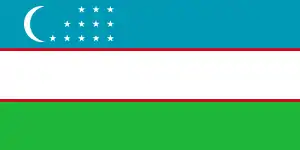 Merited Coach of Uzbekistan (Uzbek: Ўзбекистон Республикасида хизмат кўрсатган спорт устози)
Merited Coach of Uzbekistan (Uzbek: Ўзбекистон Республикасида хизмат кўрсатган спорт устози)
Non-Russian coaches
Since 2007, a few foreign coaches have been awarded the title of Merited Coach of Russia for their roles in securing Russian victories:

 2007: David Blatt, coach of the Russian men's basketball team, champions, 2007 European Championships
2007: David Blatt, coach of the Russian men's basketball team, champions, 2007 European Championships 2008: Giovanni Caprara, coach of the Russian women's volleyball team, champions, 2006 European Championships
2008: Giovanni Caprara, coach of the Russian women's volleyball team, champions, 2006 European Championships 2008: Dick Advocaat, football, head coach of Zenit St. Petersburg, champions, 2007–08 UEFA Cup and 2008 UEFA Super Cup
2008: Dick Advocaat, football, head coach of Zenit St. Petersburg, champions, 2007–08 UEFA Cup and 2008 UEFA Super Cup 2013: Guus Hiddink, football, coach of Russian national team, bronze medalists, 2008 European Championships
2013: Guus Hiddink, football, coach of Russian national team, bronze medalists, 2008 European Championships 2013: Oleg Znarok, hockey, head coach of Dynamo Moscow, champions, 2011/2012 Gagarin Cup
2013: Oleg Znarok, hockey, head coach of Dynamo Moscow, champions, 2011/2012 Gagarin Cup 2013: Harijs Vītoliņš, hockey, assistant coach of Dynamo Moscow, champions, 2012/2013 Gagarin Cup
2013: Harijs Vītoliņš, hockey, assistant coach of Dynamo Moscow, champions, 2012/2013 Gagarin Cup
Judges and referees
.jpg.webp)
The title of Honored Judge of Russia may be given to sport judges and referees who have reached the level of "All-Russian Sports Official" and have distinguished careers of officiating to their credit.
See also
References
- V.L. Shteinbakh (1974). Спортсмены стран социализма на международной арене [Socialist Athletes in International Competition] (in Russian). Moscow: Fizkultura i sport.
- DEKRET Nr.4259, datë 11.4.1967 MBI KRIJIMIN E TITUJVE “MJESHTËR I MERITUAR I SPORTIT”, “MJESHTËR SPORTI”, “KAMPJON I REPUBLIKËS POPULLORE TË SHQIPËRISË” DHE “KUADËRI DALLUAR NË SPORT”
- "Приказ Федерального агентства по физической культуре и спорту от 25 сентября 2006 г. N 634 "Об учреждении почетных спортивных званий"". RG.ru (in Russian). 25 January 2007. Retrieved 31 October 2016.
- Semar G.M. (1987). Под одним небом:Об испанском антифашисте, советском футболисте А.Гомесе [Under One Sky: Spanish anti-fascist and Soviet football player A.Gomez] (in Russian). Moscow: Molodaya Gvardiya.
- Yuri Petrov (1995). "Red Square of Agustín Gómez". Futbol (in Russian). Retrieved 31 May 2010.
- Augustin Gomez
- Panorama of the 1972 Sports Year (in Russian). Moscow: Fizkultura i sport. 1973. pp. 122–124.
External links
- "Приказ: Об утверждении Положения о присвоении почетных спортивных званий" [Decree: Approval of Awarding Honorary Sports Titles] (in Russian). Ministry of Sport (Russia). 27 November 2008.
- Great Soviet Encyclopedia, 3rd ed., vol. 9, p. 64